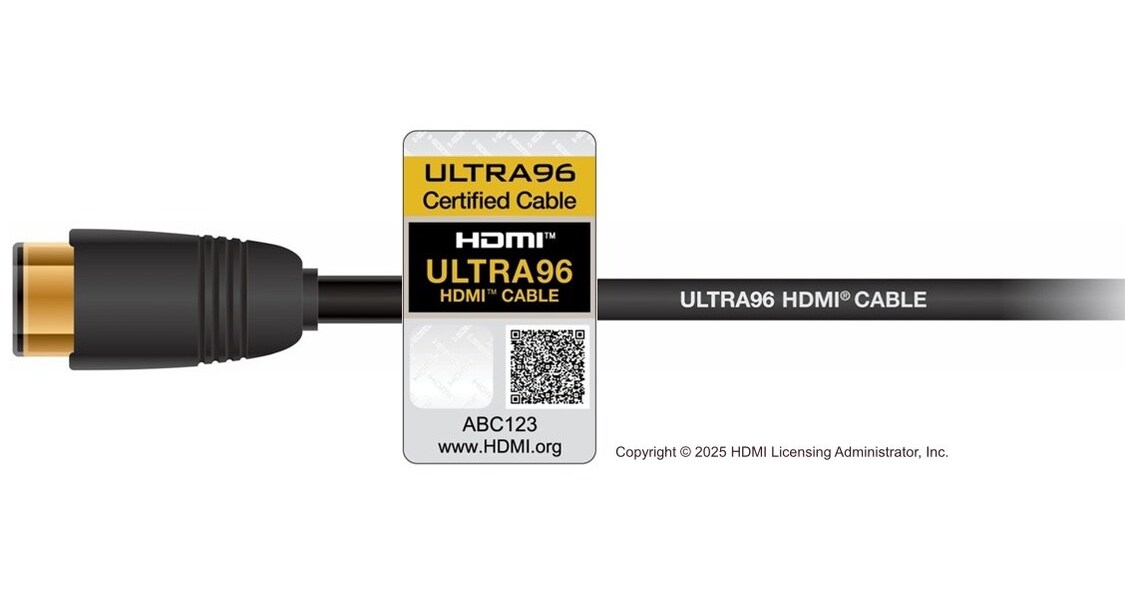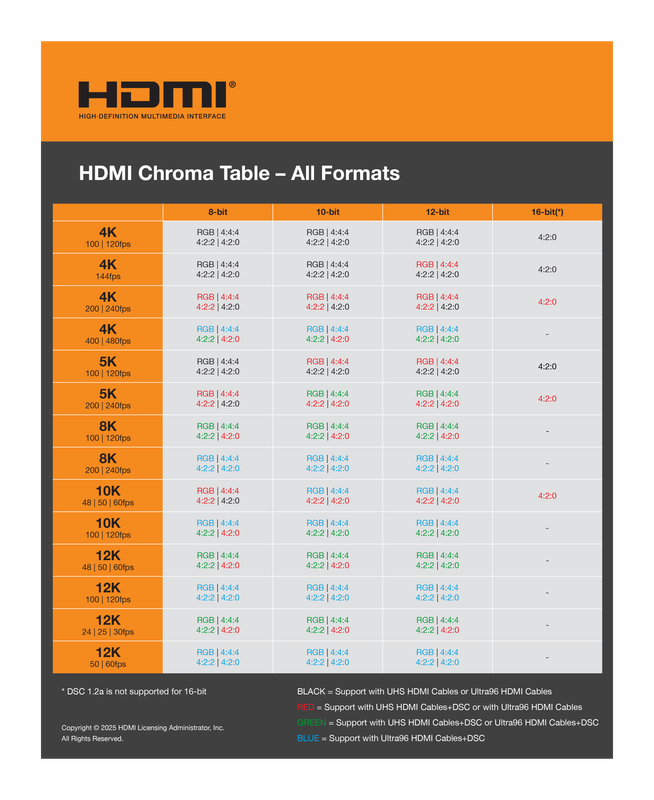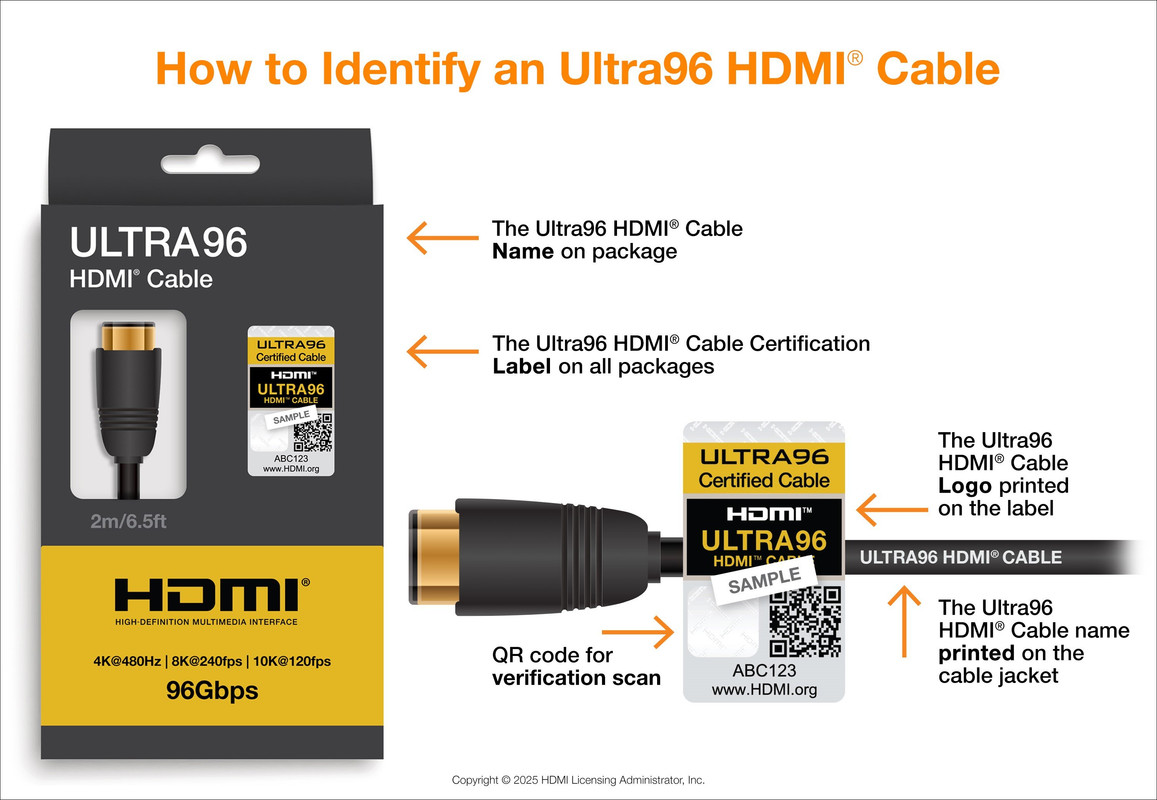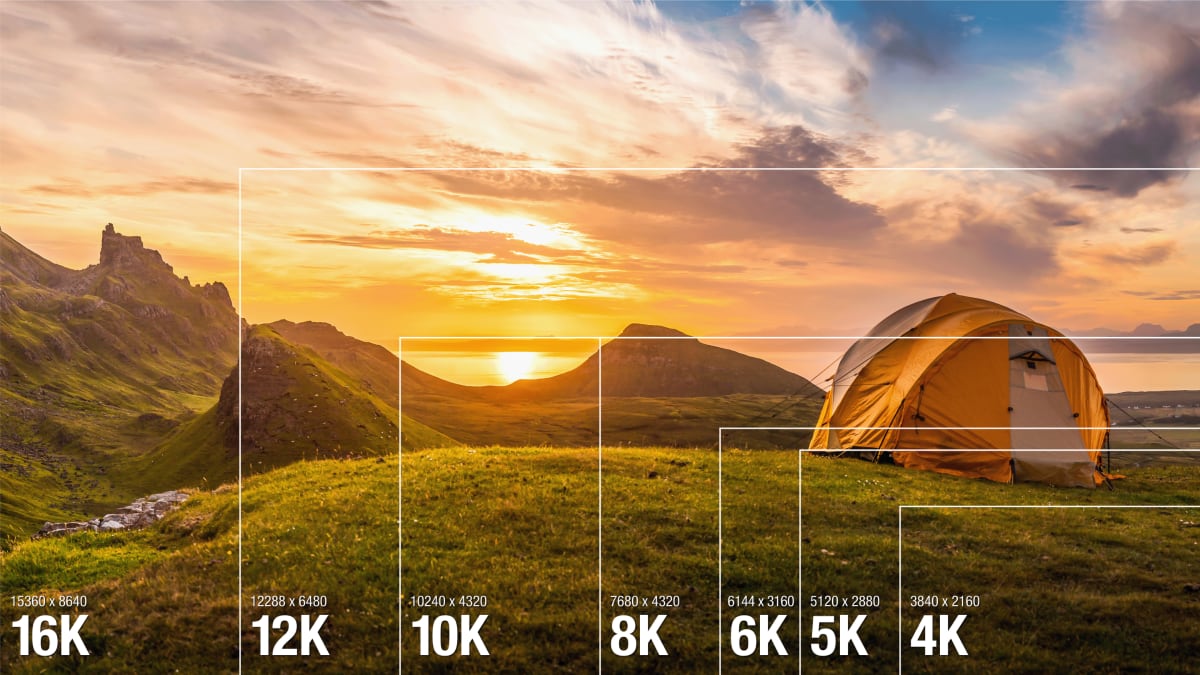
HDMI FORUM ANNOUNCES VERSION 2.2 OF THE HDMI SPECIFICATION
/PRNewswire/ -- HDMI Forum, Inc. today announced the upcoming release of Version 2.2 of the HDMI Specification. The new HDMI Specification delivers enhanced...






Good to see the sync issues are being improved. Definitely a quality of life improvement that’s needed. Depending on source, I have various different audio delays to program into my amp.
Someone smarter may know this - with cables at 96gbps, why are we using copper instead of something like a new fibre optic standard? Surely things like attenuation and the issues with so many HDMI cables I’ve had (that can’t carry the signal intended, sometimes over time) would be avoided. Perhaps new issues introduced but it feels like we must be getting near some limit of practicality on copper. A certification is certainly one thing that is important but it’s tricky to even know which brands to trust.
I also find the implementations of ARC and CEC often lacking and flaky. Is it just me?
Have you seen the coat of the fibre hdmi cables? Can imagine many people paying 100 quid for a cable, it's like being back with monster scary leadsGood to see the sync issues are being improved. Definitely a quality of life improvement that’s needed. Depending on source, I have various different audio delays to program into my amp.
Someone smarter may know this - with cables at 96gbps, why are we using copper instead of something like a new fibre optic standard? Surely things like attenuation and the issues with so many HDMI cables I’ve had (that can’t carry the signal intended, sometimes over time) would be avoided. Perhaps new issues introduced but it feels like we must be getting near some limit of practicality on copper. A certification is certainly one thing that is important but it’s tricky to even know which brands to trust.
I also find the implementations of ARC and CEC often lacking and flaky. Is it just me?
 . I think hdmi is only 5 m max anyway and after that it's fibre, likely for those reasons.
. I think hdmi is only 5 m max anyway and after that it's fibre, likely for those reasons.Have you seen the coat of the fibre hdmi cables? Can imagine many people paying 100 quid for a cable, it's like being back with monster scary leads. I think hdmi is only 5 m max anyway and after that it's fibre, likely for those reasons.
I'm not actually sure what the difference is between the internals of toslink Vs hdmi fibre, I assume much lower wavelength (thus bad for eyes) to get the throughout.I suppose they are not common so a bit niche and therefore expensive. But they are cables that encode/re-encode the signal to and from HDMI so that fibre can be used. I was thinking more like a fibre connectivity standard that means future TVs and hardware would have that built in, so the cabling was only a simple fibre connection, which would be cheaper. Maybe it makes devices more costly though. I have some TOSLINK cables that are basically that I believe, but that is a very old standard. But maybe you can see what I mean.

Good thing there's loads of GPUs that can run 4k at 480fps
HDMI 2.2 released: Supports 4K 480Hz, 8K 240Hz, even 16K
Here's everything you need to knowwww.flatpanelshd.com
HDMI 2.2 released: Supports 4K 480Hz, 8K 240Hz, even 16K
After being announced at CES 2025, the HDMI 2.2 specification has now been officially released, enabling consumer electronics makers to begin planning and implementation.
HDMI 2.2 doubles the bandwidth of HDMI 2.1 from 48 to 96 Gbps, unlocking support for higher resolutions and refresh rates in TVs, media players, game consoles, VR headsets and more.
 . I know it's a chicken and egg, so might see the connection make it's way to high end stuff.
. I know it's a chicken and egg, so might see the connection make it's way to high end stuff.In a way I'm kinda glad to see these HDMI 2.2 certified cables coming.
I've found it can be a nightmare to get good working HDMI 2.1 cables, even certified, a lot of them can be very hit and miss. 4K60 seems to be relatively achievable now, but I recently had to replace a certified 2.1 cable after upgrading to a new 4k120 capable AV Receiver setup, and it took 3 attempts to get one that worked properly and somewhat reliably at 4K120 with HDR etc. Unfortunately getting a decent cable tester is quite expensive, and the ones built into at least Denon AVRs seem somewhat inconsistent, but at least a cable that cannot do the higher bandwidth always fail, whereas good cables will only fail some of the time, so as long as I rerun the test 4-5 times, it'll usually come up on at least a few of them as passing the higher bandwidth tests lol
These were all HDMI 2.1 certified cables too!
With the HDMI 2.2 specs being more demanding, it should get easier to get cables capable of doing this, even if they cost a bit more, as 96Gbps tested cables shouldn't struggle to pass 48Gbps.
Are we going to get Tv's with 1 HDMI port that only supports HDMI 2.2 like before.
No doubt it will be LG and Samsung providing the full beans again on all ports while the likes Sony and Panasonic likely providing only one.That depends on the SoC available. LG has always had four hdmi 2.1 ports, its Sony and other small brands that don't have their own SoC that buy crappy off shelf ones
Glad to hear, I didn't try Anker ones, but had bought a load of others, and lets just say hit and miss!! When I was trying to sort my issues earlier, I bought at least 3 cables, and already had multiple that were meant to be capable, but hit and miss to the extreme.Ive had no trouble with Anker HDMI 2.1 cables - bought a whole load for various sources after I upgraded my receiver and no problems 4k120
Agree its good theyre going to put better checks in place. I have to admit I read a lot of bad stuff about the reliability of HDMI 2.1 cables but Ive had a number of Anker devices over the years and never had any reliability issues so I stuck with them...Glad to hear, I didn't try Anker ones, but had bought a load of others, and lets just say hit and miss!! When I was trying to sort my issues earlier, I bought at least 3 cables, and already had multiple that were meant to be capable, but hit and miss to the extreme.
That, hopefully, means Anker are regularly/thoroughly testing batches before passing to inventory, but based on my experience many others are not as reliable; or maybe I got unlucky; but I tried a number of brands, KabelDirect, Zeskit Maya, Sniokco and others, and even though some of these came very highly rated and reviewed, and were all supposedly HDMI2.1 certified (and they werent excessively long either, 2M IIRC), they did not all pass reliably, or encountered issues when running 4k120 with HDR (4K120 without HDR was more reliable, and 4K60 was generally fine, but as you pushed up the bandwidth requirements, the number of cables that just worked every time dwindled). As I remember the 2nd KabelDirect one was the one that ended up staying in the setup; but the whole thing sent me for a good run around for a week or two of replacements/reordering etc.
I do wish the Denon AVR HDMI tester was more reliable, as that fails intermittently on known good cables; but I had multiple issues with faulty cables that just did not work as promised and caused issues (and would fail the tester consistently no matter how many times I ran it, cables that are good would at least pass if you re-ran the test multiple times, and would pass at least sometimes).
If I need to buy more, I'll add Anker to the list of ones that are probably good.
Either way, this is why I'm happy that the HDMI 2.2 cable certification and testing standards sound to be more stringent and demanding. Hopefully means less faulty/inadequate inventory reaching consumers; and cables are always a headache if they're not right, as then you've got to work out whether the issue is configuration, equipment or the cable, and that's always a pain.



